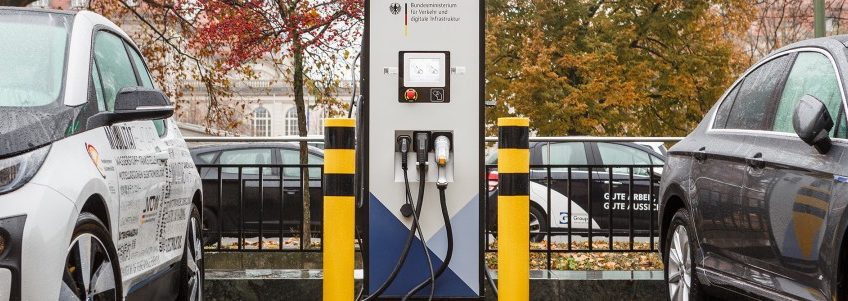5th funding call for charging infrastructure for e-vehicles runs until 17 June 2020 22,000 charging points already approved in the funding programme, including over 5,000 fast charging points Since the beginning of the year, NOW GmbH has been establishing the German Centre for Charging Infrastructure to further develop the charging infrastructure in Germany and implement the master plan. The goal: Charging infrastructure must be convenient, reliable and be accessible nationwide.
Berlin, 5 June 2020 – Private investors, cities and municipalities can still submit applications for funding for the development of charging infrastructure for electric vehicles until 17 June 2020. In its fifth call for funding under the “Charging infrastructure for electric vehicles in Germany” funding guideline, the Federal Ministry of Transport and Digital Infrastructure (BMVI – Bundesministerium für Verkehr und digitale Infrastruktur) is supporting the establishment of up to 7,000 normal and 3,000 fast charging points. In contrast to previous calls for funding, the current call for funding also promotes charging points in customer parking lots. Here, accessibility only has to be guaranteed for 12 hours instead of 24 hours as was previously the case.
Since the start of 2017, applications for a total of 22,000 charging points have been approved under the “Charging infrastructure for electric vehicles” funding programme, including over 5,000 fast charging points (status April 2020). This corresponds to a funding volume of around 140 million euros. Just under 8,500 of the funded charging points are already in operation. According to the Federal Network Agency (Bundesnetzagentur) there are currently 25,400 charging points in Germany.
German Centre for Charging Infrastructure – demand planning, coordination, implementation
In addition to the funding of charging infrastructure in the programme, the German government presented a Charging Infrastructure Master Plan in 2019, which defines how a nationwide expansion can be achieved with targeted funding, improved legal framework conditions and active coordination between the federal government, the states, municipalities and industry.
Since the beginning of the year, NOW GmbH has been establishing the German Centre for Charging Infrastructure to further develop the charging infrastructure in Germany and implement the master plan. This is where the coordinated development of a nationwide fast-charging network is first planned and implemented. The focus at all times is on the question of the conditions necessary for users to switch to a different drive technology. The answer: in future, charging infrastructure must be convenient, 100% reliable and comprehensively available throughout Germany. Regardless of whether the user is travelling on the island of Rügen, in the Black Forest or in the city centre of Cologne: there must be sufficient charging points at all charging locations to avoid long delays. In this context, it will also be determined by when the charging points must be set up and how registration and payment should take place. It will also work towards a standardisation of prices and demand continuous, reliable operation. This means planning security for both consumers and manufacturers of electric vehicles.
With the “StandortTOOL” location tool for alternative fuel infrastructures (www.standorttool.de), NOW GmbH has developed a planning tool with which this infrastructure can be planned throughout Germany until 2030 and the future expansion requirements can also be calculated. Among other things, traffic and mobility data, user data of electric vehicles and socio-economic data are included. In addition, the centre analyses the forthcoming vehicle ramp-up and the resulting effect on the charging requirements.
Coordinating the activities of the federal and state governments as well as industry
Today, the federal states also have access to the StandortTOOL location tool and can use it to plan their activities and coordinate them with federal activities. The coordination of federal and state activities as well as the support of the municipalities in planning and implementing the charging infrastructure development are further core tasks of the German Centre for Charging Infrastructure, which NOW GmbH commenced establishing at the beginning of 2020. In the so-called Project House, cooperation between the federal and state governments, as well as the energy industry and automobile manufacturers, is organised, particularly with regard to customer friendliness and technology. In structural terms, this cooperation is to be reflected in the establishment of an advisory board for the German Centre for Charging Infrastructure, consisting of representatives of customers, environmental and nature conservation, science, industry and politics.
New tendering scheme for charging points
The German Centre for Charging Infrastructure is currently working on a new instrument for financing charging infrastructure, in particular with a view to establishing a nationwide and demand-oriented fast-charging infrastructure. At present, there are still only a limited number of viable business models for the construction and operation of charging infrastructure, mainly because there is a lack of vehicles. However, there will continue to be economic locations in the future, and those that will continue to be poorly served. Nevertheless, these are of great importance for a nationwide network and for user acceptance. The federal government will put out to tender larger lots in which these types of locations will be bundled. A new financing model will provide start-up financing for periods when the charging points cannot be operated profitably. This will provide planning security for operators.


